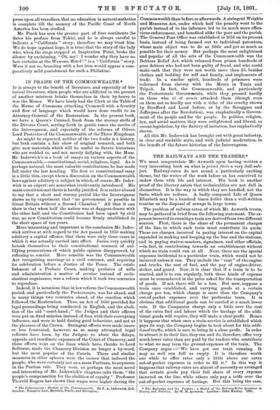IN PRAISE OF THE COMMONWEALTH.* IT is always to the
benefit of literature, and especially of his- torical literature, when people who are addicted to the pursuit of another mistress betake themselves in their by-hours to woo the Muses. We have lately had the Clerk at the Table of the House of Commons attacking Cromwell with a ferocity and flow of language which would have done credit to an Attorney-General of the Restoration. In the present book, we have a Queen's Counsel, fresh from the stormy strife of the Divorce Court, setting forth in gentle tones the merits of the Interregnum, and especially of the reforms of Oliver, Lord Protector of the Commonwealth of the Three Kingdoms.
As might be expected, neither of the two books is a history, but both contain a fair show of original research, and both give new materials which will be useful to future historians who are wedded to, and not merely dallying with, the Muse. Mr. Inderwick's is a book of essays on various aspects of the Commonwealth,—constitutional, social, religious, legal. As is perhaps natural, the most valuable contributions he has made fall under the last heading. The first or constitutional essay is a little thin, except when a discussion on the Commonwealth laws against adultery (a subject in which, of course, Mr. Elder- wick is an expert) are somewhat irrelevantly introduced. His main constitutional thesis is hardly justified. It is rather absurd to say that a short and stormy period like the Interregnum shows us by experiment that " no government is possible in Great Britain without a Second Chamber." All that it can show is that when half the nation was at daggers-drawn with the other half, and the Constitution had been upset by civil war, no new Constitution could become firmly established in the short space of ten years.
More interesting and important is the conclusion Mr. Inder- wick arrives at with regard to the Act passed in 1650 making adultery a capital offence, that there were only three cases in which it was actually carried into effect. Juries very quickly betook themselves to their constitutional resource of nul- lifying prosecutions of which public opinion disapproved, by refusing to convict. More sensible was the Commonwealth Act recognising marriage as a civil contract, and requiring its celebration before a Justice of the Peace. The estab- lishment of a Probate Court, making probates of wills and administration a matter of secular instead of eccle- siastical cognisance, was a reform which it took two centuries to reproduce.
Indeed, it is notorious that in law reform the Commonwealth period, and particularly the Protectorate, was far ahead, and in many things two centuries ahead, of the reaction which followed the Restoration. Thus, an Act of 1650 provided for legal proceedings being conducted in English, and the aboli- tion of the old " court-hand ; " the Judges and their officers were put on fixed salaries, instead of fees, with their corrupting influence, and were to hold during good behaviour, and not at the pleasure of the Crown. Stringent efforts were made (more or less frustrated, however, as so many attempted legal reforms have been, by the Judges) to abate the delays, appeals, and inordinate expenses of the Court of Chancery, and these efforts went on the lines which have, thanks to Lord Selborne, made the Chancery Division no longer a by-word, but the most popular of the Courts. These and similar measures in other spheres were the causes that induced the people, who were certainly not as a mass Puritans, to acquiesce in the Puritan rule. They were, as perhaps the most novel and interesting of Mr. Inderwick's chapters calls them, " the people's compensation for the abolition of royalty." Professor Thorold Rogers has shown that wages were higher during the
• The Interregnum : Studies of the Commonwealth. By F. A. Inderwiok, London : Sampson Low, Marston, Searle, and Rivington. Commonwealth than before or afterwards. A stringent Weights and Measures Act, under which half the penalty went to the parish instead of to the informer, led to its much more effica- cious enforcement, and benefited alike the poor and the pariah. The General Post Office was established in 1656 on its present basis, instead of being farmed out to individual patentees, whose main object was to do as little and get as much as possible for their money. But perhaps the most enlightened and popular of all the acts of the Commonwealth was the Debtors Relief Act, which released from prison hundreds of poor debtors who had not been guilty of fraud, and who could make oath that they were not worth more than £5, besides clothes and bedding for self and family, and implements of trade. In a similar spirit, hundreds of prisoners were redeemed from slavery with the Moors in Tunis and Tripoli. In fact, the Commonwealth, and particularly the Protectorate Governments, while they pressed hardly on those who vi et armis attacked them (though even on them not so hardly nor with a tithe of the cruelty shown by Strafford and Laud before, or by the Scroggses and Jeffreyses after the Revolution), was emphatically a Govern- ment of the people and for the people. In politics, religion, law, and social matters, they were enlightened and liberal, as recent legislation, by the flattery of imitation, has emphatically shown.
All this Mr. Inderwick has brought out with great industry, in clear and readable style, and with judicial moderation, to the benefit of the future historian of the Interregnum.


















































 Previous page
Previous page